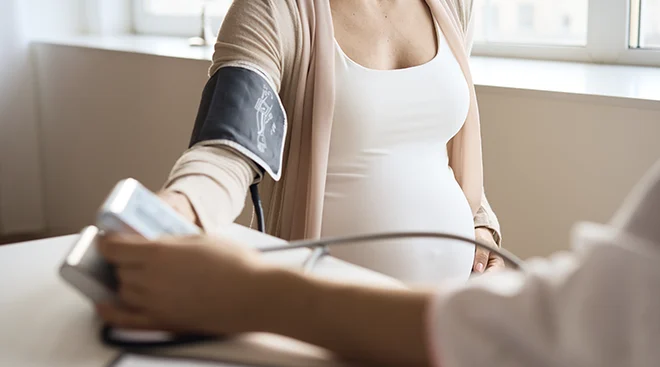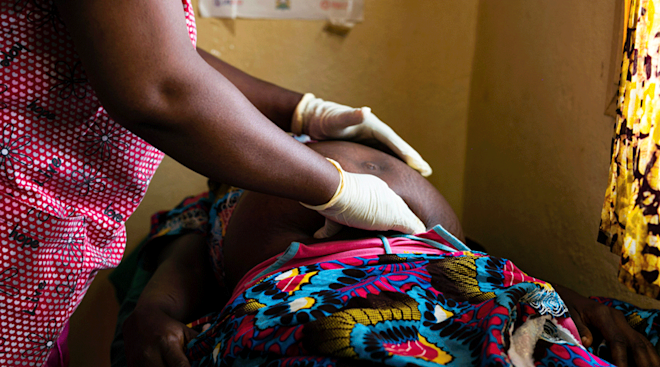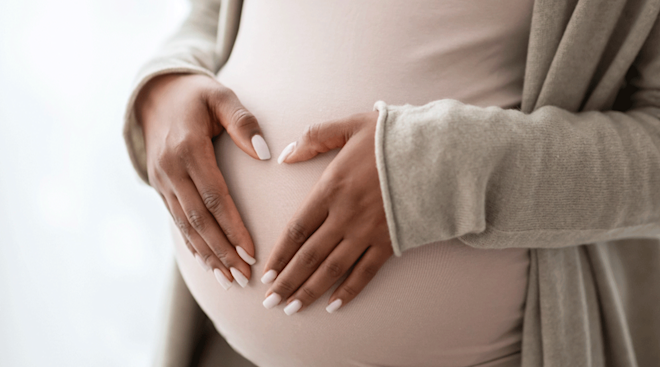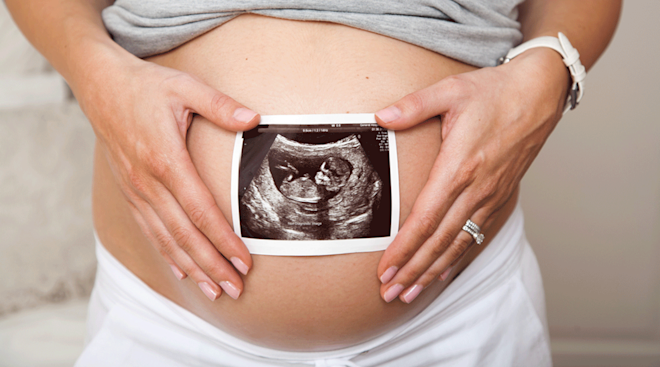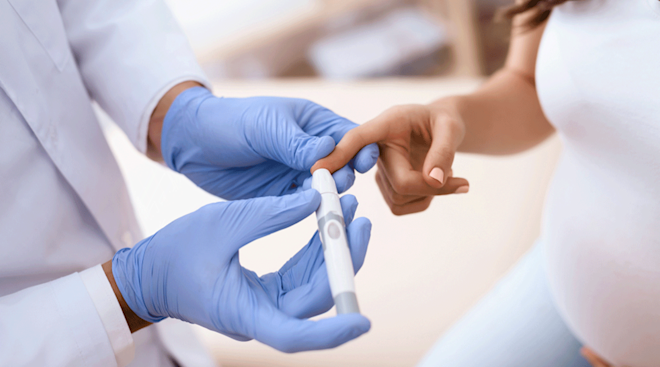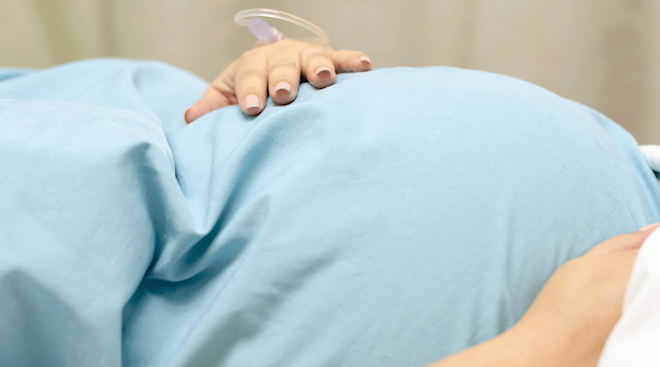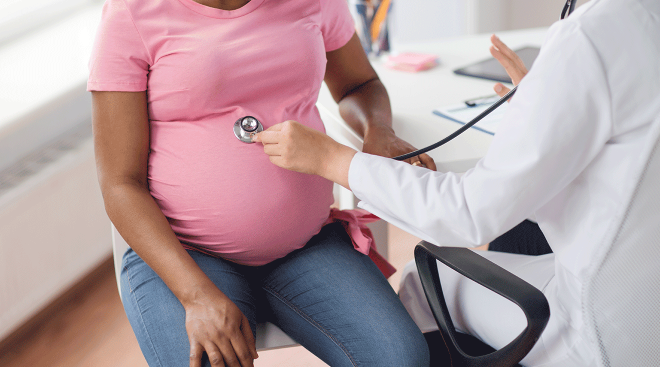What You Need to Know About Preeclampsia
Pregnancy presents a world of great unknowns. With each new pain, headache or limb that swells, it’s hard to know which physical sensations should be red-flagged for your doctor, and which you can just chalk up as par for the course. So how do you prepare for a condition like preeclampsia, which often shows up without warning or with symptoms that sneakily resemble common effects of pregnancy? Keep reading to learn preeclampsia can mean for you and baby and what to do if you receive a preeclampsia diagnosis.
Preeclampsia is a pregnancy complication marked by high blood pressure, protein in your urine and other signs of organ damage, like pain in your stomach (specifically the right upper quadrant); sudden swelling of the face, hands and extremities and blurry vision. While it’s far from common—impacting roughly 5 to 8 percent of all pregnancies—preeclampsia can pose risks for mom and baby. And here’s the rub: Preeclampsia, which generally doesn’t show up until after 20 weeks of pregnancy, often occurs in women who haven’t reported feeling sick or noticing symptoms.
“Preeclampsia is called the great imitator,” says Donald Wothe, MD, an ob-gyn and perinatologist with Allina Health’s Minnesota Perinatal Physicians in Minneapolis. “It can show up with high blood pressure or pain in the abdomen or a lot of other non-specific-type symptoms that people get all the time. It’s hard to say, ‘this is what to look out for with preeclampsia.’” Which is why it’s so important to go to your prenatal care visits, during which your doctor will check your vitals and keep a sharp lookout for any warning signs.
How does preeclampsia affect the mother?
If left untreated, preeclampsia can lead to life-threatening conditions such as HELLP Syndrome—a condition that affects the breakdown of red blood cells, how blood clots and liver function—eclampsia (the onset of seizures in a pregnant woman) and organ damage in mothers.
How does preeclampsia affect the baby?
Preeclampsia can potentially affect baby’s growth, leading to low birth weight. “Because it’s a problem with blood flow and blood pressure, the placenta doesn’t function as well as it should,” says Isabelle Cohen, MD, an ob-gyn at Stanford Medicine in San Pablo, California. “It might be smaller than we expect and fluid levels can be abnormally low.” Severe preeclampsia may also lead to a premature delivery. Very, very rarely, preeclampsia might cause an abruption, which is when the placenta detaches from your uterine wall before baby is born, which can be fatal for the baby.
Regular check-ups with your health provider is the best way to detect—and possibly head-off—preeclampsia. Wothe says asking about a patient’s medical history is the first step in knowing how closely to monitor a mother’s propensity for preeclampsia. “At the very first visit, a mom will be asked if she has had any issues with blood pressure,” he says. “Other risk factors include things like a history of diabetes, a previous pregnancy that had preeclampsia, moms who have kidney disease or have had a kidney transplant.”
Your blood pressure and urine are monitored at every checkup, and once you hit 20 weeks, if your doctor records more than one abnormally high blood pressure reading a few hours apart—higher than 160 over 100—they’ll recommend additional blood and urine tests. A preeclampsia diagnosis comes with continually high blood pressure and one or more of the following conditions: low platelet count, protein in your urine, signs of kidney problems, fluid in your lungs and/or headaches or blurry vision.
No one knows exactly what causes preeclampsia. Wothe notes that it stems from something going wrong with hormonal signaling and the lining of blood vessels when the placenta is first being formed. Women with preeclampsia tend to have smaller blood vessels that don’t react as they should to hormonal signaling, which can mean less blood flowing through them. But certain factors can put women at higher risk. Those preeclampsia risk factors include:
- Having preeclampsia with a previous pregnancy
- Your age; if you’re less than 20 years of age or older than 35
- Obesity
- Having certain medical conditions before you became pregnant, including high blood pressure, diabetes, kidney disease, lupus, or other autoimmune disorders
- Race; African American women have a higher chance of developing preeclampsia than women of other races
- Carrying multiples
Because the placenta is in such an active state of growing during the first half of your pregnancy, preeclampsia signs rarely show up until after 20 weeks, says Wothe, and doctors won’t make a diagnosis before this stage in pregnancy. The most common early signs of preeclampsia are high blood pressure (exceeding 140 over 90) and protein in your urine. In cases of severe preeclampsia, possible symptoms include:
- Blood pressure higher than 160 over 100
- Severe, persistent headaches
- Changes in vision, including temporary loss of vision, blurred vision or light sensitivity
- Nausea or vomiting in mid- or late-pregnancy
- Upper abdominal pain, usually under your right ribs
- Low urine output
- Shortness of breath, caused by fluid in your lungs
- Kidney disorders
- Blood disorders, like low platelets
- Sudden weight gain
- Swelling, particularly in your face and hands
Call your doctor if you’re having severe headaches, blurred vision, abdominal pain or are peeing really infrequently.
Your doctor will prescribe medication to keep your blood pressure low. If you have severe preeclampsia, they might give you a dose of magnesium sulfate to prevent the onset of seizures. If they anticipate delivering your baby early, you might get a steroid to help baby’s lungs mature sooner. Keep in mind, though, that these solutions only treat preeclampsia symptoms. “There is no way to reverse preeclampsia,” says Wothe. “The only true cure is to deliver the baby and the placenta.”
If you’re given a preeclampsia diagnosis before your due date, your doctor will likely treat your symptoms and monitor you and baby diligently, trying to get your pregnancy as close to 34 weeks as they can. “We know that babies do pretty well when delivered at that age,” says Cohen. Once baby is delivered, it should only take a couple of weeks for your body to recover from preeclampsia.
Many moms-to-be are eager to learn how to prevent preeclampsia–but unfortunately there’s no sure-fire way. While your doctor may recommend blood pressure medicine and/or a healthy diet and exercise if you have certain risk factors like high blood pressure or obesity, “other things, like the number of pregnancies you’ve had or your race, aren’t as easy to change,” says Cohen. “Some patients have asked if we can predict preeclampsia with blood tests, but as for now, it’s mostly investigational.”
If you exhibit more than one high-risk or even moderate-risk factor between 12 and 28 weeks of pregnancy, your provider will probably prescribe a low daily dose of aspirin—an 81-milligram tablet. Aspirin helps keep your blood thin, and recent studies have shown it to reduce preterm preeclampsia among high-risk women.
It’s very rare, but some mothers contract preeclampsia within a day or two of giving birth, and in even more unlikely cases, up to six weeks postpartum. “Generally, delivery cures preeclampsia, but it can persist or be present for the first time postpartum,” says Cohen.
The signs of postpartum preeclampsia are the same as preeclampsia symptoms during pregnancy. It can be hard to be totally in tune with your body when you’re exhausted and busy with your newborn, but you should let your doctor know immediately if you’re having any changes in vision (like seeing spots) or are experiencing swelling in your hands or face, shortness of breath, stomach pain, nausea or vomiting, or severe headaches. These are all potential signs of postpartum preeclampsia. If you think you may be exhibiting symptoms, it’s important to get it checked out right away. As in pregnancy, if you leave postpartum preeclampsia untreated, it can lead to seizures, organ damage, stroke or death.
If your doctor confirms the condition, postpartum preeclampsia treatment is exactly the same as the treatment you’d receive during pregnancy. “Mothers are given blood pressure medicine and magnesium sulfate to help prevent seizures,” says Wothe. Because it’s given intravenously—your body absorbs it too slowly if you take it orally—you’ll be admitted to the hospital until the course is done, usually within 48 hours. Both high blood pressure medications and magnesium sulfate are generally considered safe to take when you’re nursing, and your doctor will fill you in on anything that could get passed through to baby.
Please note: The Bump and the materials and information it contains are not intended to, and do not constitute, medical or other health advice or diagnosis and should not be used as such. You should always consult with a qualified physician or health professional about your specific circumstances.
Plus, more from The Bump:
Isabelle Cohen, MD, is an ob-gyn at Stanford Medicine in San Pablo, California. She earned her medical degree from Albany Medical College in New York.
Donald Wothe, MD, is an ob-gyn and perinatologist with Allina Health's Minnesota Perinatal Physicians in Minneapolis. He earned his medical degree from the University of WA-Department of Medicine.
Learn how we ensure the accuracy of our content through our editorial and medical review process.
Navigate forward to interact with the calendar and select a date. Press the question mark key to get the keyboard shortcuts for changing dates.
































